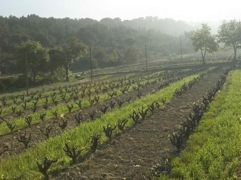
Organic Viticulture vs. Conventional Viticulture: Effects on Soil Quality and Health
| February 04, 2012
Organic farming has become increasing popular in all areas of agriculture, including the field of viticulture. Between 2001 and 2008, the area of organically farm vineyards in France increased by 110%. In lieu of pesticides, which are of synthetic origin when used for conventional farming practices, organic farming utilizes tillage or grass-cutting for weed management. Organic farming aims to increase soil biological function by improving upon its physical, chemical, and biological properties; including water circulation and aeration, availability of nutrients, and biodiversity. By improving upon these properties, soil quality is thus enhanced.
In addition to the aforementioned health indicators, soil scientists and viticulturists consider soil microorganisms to be very important indicators of soil health, as these microorganisms form very close relationships with their surroundings. Microorganisms in the soil are important for many reasons, including the decomposition of organic matter, humus formation, nutrient cycling, and symbiotic relationships with other organisms in the soil. Macroorganisms, for example nematodes and earthworms, are also important indicators of soil health, since they are present in all types of soil and frequently alter the physical properties of it, which indicates the fate of the organic matter of the soil.
There hasn’t been much research by way of organic viticulture and its’ effects on long term soil health, though one study aimed to measure the long-term effects of organic viticulture by physical and chemical indicators, as well as the availability of micronutrients, contaminants, and bioindicators (macroorganisms). Comparing conventional viticulture practices with organic viticulture practices established at various time points, one study measured physical, chemical, and biological parameters in the soil, in order to determine if organic viticulture was in fact better for the environment over time than conventional viticulture.
The results of this study found that during the conversion period between conventional and organic farming, there was a marked decrease in nutrient resources available in the soil, which was possibly due to an exhaustion of available phosphorus that was built up from conventional fertilizers rich in phosphorous and other nutrients. After these resources were exhausted, the study found the nutrients started to recover, noting an increase in phosphorous (P) and potassium (K) over time with organic methods, which could be from microorganisms releasing organic acids that could convert to available P and K. This result can also be explained by the observed increase in soil microbial biomass over 7 years of organic farming, which could also explain why P and K were found to increase, since these microbes produce P and K as natural byproducts of metabolism.
The study also showed that organically managed plots had higher levels of total organic carbon, which indicates high soil quality. This result was partially attributed to the abundance of grass cover in the organically managed plots, which helped increase the overall total organic carbon levels. This total organic carbon acts as a nutrient resource for microorganisms, which stimulates microbial growth and increases soil health and quality overall. The end result of this study was that there are clear differences in soil quality between conventional and organically managed vineyards over time. During the transition period between conventional and organically managed plots, there is a decrease in available resources, due to exhaustion of the excess nutrients that were created from synthetic fertilizers used under conventional farming practices. Once the microbial community in the soil starts producing their own soil nutrients via metabolism byproducts and increased grass cover increases soil carbon supplies, microbial growth is stimulated and increases the quality of the soil overall.
For more information and even more results of this study, please here to read more about it.
About The Author
Rebecca Yeamans
Becca Yeamans is the owner/writer of the science-based wine blog, The Academic Wino, as well as the Tasting Room Manager at a vineyard in central Virginia. With a Bachelor of Science in Biology and a Master of Science in Environmental Science, her solid background in science and research allows her to approach wine blogging with a unique style that is both informative to those in the industry, and entertaining for those simply wishing to learn.


